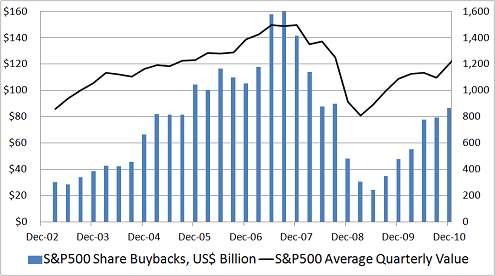Is Xerox's Buyback Good for Investors?
I'm highly skeptical about the economic value of most share repurchase programs. To see why, look at the following graph of the total buyback dollar amount for the companies in the S&P 500, compared to the average price of the index on a quarterly basis:

Source: Standard & Poor's
Source: Standard & Poor's
Share buybacks for the S&P 500 accelerated in the second half of 2004, culminating in a sharp spike during the first two quarters of 2007 -- just as the stock market was peaking. Conversely, when stocks traded at bargain prices during the worst of the crisis, share buybacks dried up. Then, as stocks became more expensive during the rally that began in March 2009, companies were once more happy to step up the dollar amounts spent on share repurchases.
Still, not all buyback programs hurt shareholders. In order to ferret out the smart capital allocators and shame those who fritter away shareholder capital, I'm tracking newly announced share repurchase programs. Today, it's the turn of document technology and services stalwart Xerox (NYS: XRX) .
How much, for how long?
Xerox's new repurchase authorization adds $500 million to the current program for a total of $1.3 billion. The company expects to use roughly $1 billion to repurchase shares in 2012.
How cheap is the stock?
The buyback announcement contains no reference to price or intrinsic value. That's a red flag, because the relationship between price paid and intrinsic value is the only factor that determines whether the share repurchases are compounding or destroying shareholder wealth. How are we to know if Xerox management understands this (or whether they care)? Just how cheap (or expensive) are the shares right now? Based on price-to-earnings, Xerox shares trade in the middle of a group of four of its large-cap peers:
Company | Forward P/E |
|---|---|
Accenture | 14.7 |
IBM | 12.9 |
Dell (Nasdaq: DELL) | 8.5 |
Hewlett-Packard (NYSE: HPQ) | 6.9 |
Xerox | 6.8 |
Source: S&P Capital IQ
Is this a buy signal?
Xerox's price-to-earnings multiple is in the bottom quintile relative to its own five-year history, its primary industry group, and the S&P 500 (that's also the case of Dell and Hewlett-Packard, by the way.) At less than seven times next-twelve-months' estimated earnings, the shares look like a pretty good bargain and share repurchases at current levels should enhance shareholder value. In fact, I'm going on record: I expect H-P to beat the market over the next three to five years (if not sooner), and I'm adding it to my tracking account in CAPS, where anyone can verify the success of my call.
At the time thisarticle was published Fool contributorAlex Dumortierholds no position in any company mentioned.Click hereto see his holdings and a short bio. You can follow himon Twitter. The Motley Fool owns shares of International Business Machines.Motley Fool newsletter serviceshave recommended buying shares of Accenture; and writing covered calls in Dell. Try any of our Foolish newsletter servicesfree for 30 days. We Fools may not all hold the same opinions, but we all believe thatconsidering a diverse range of insightsmakes us better investors. The Motley Fool has adisclosure policy.
Copyright © 1995 - 2012 The Motley Fool, LLC. All rights reserved. The Motley Fool has a disclosure policy.

